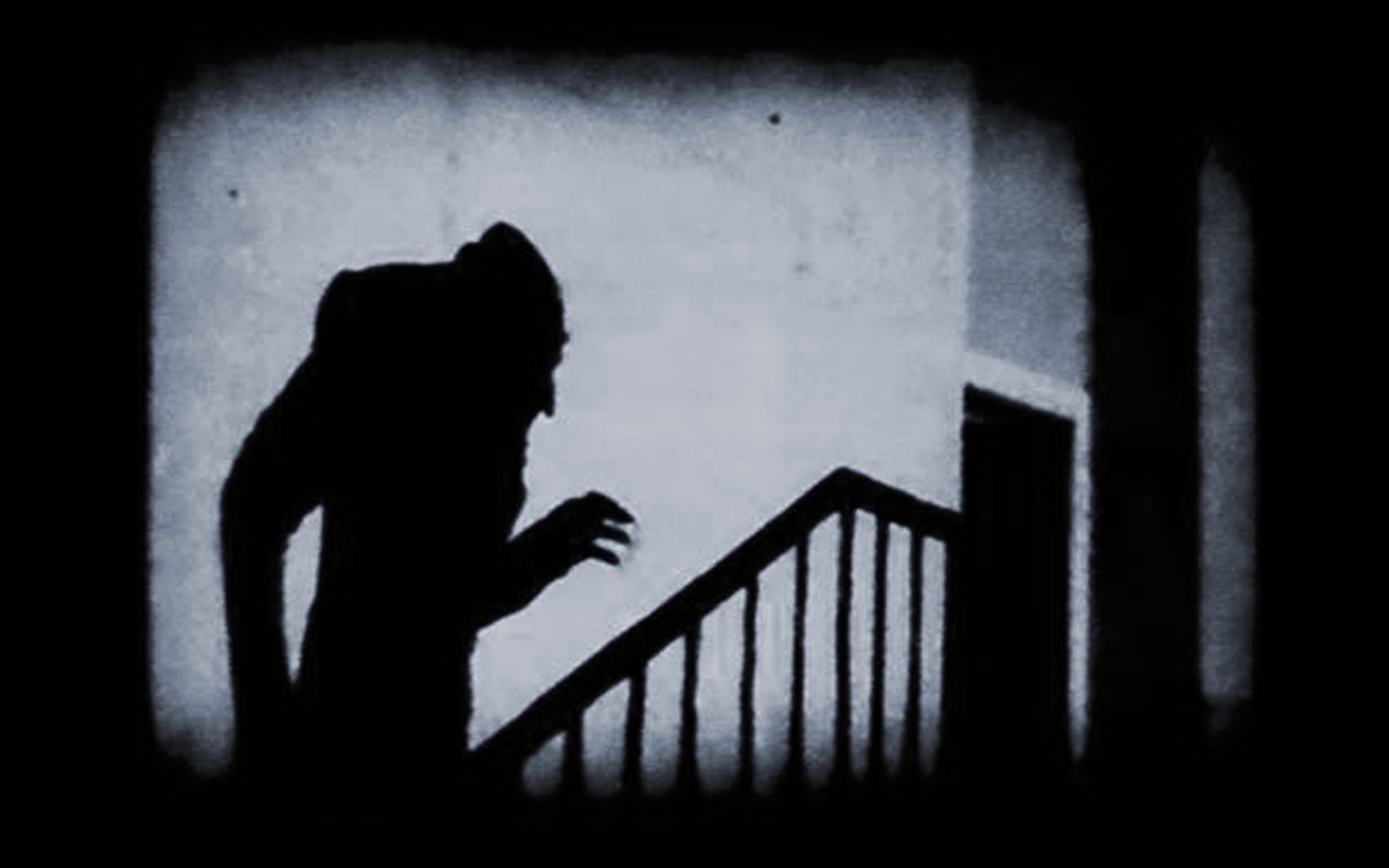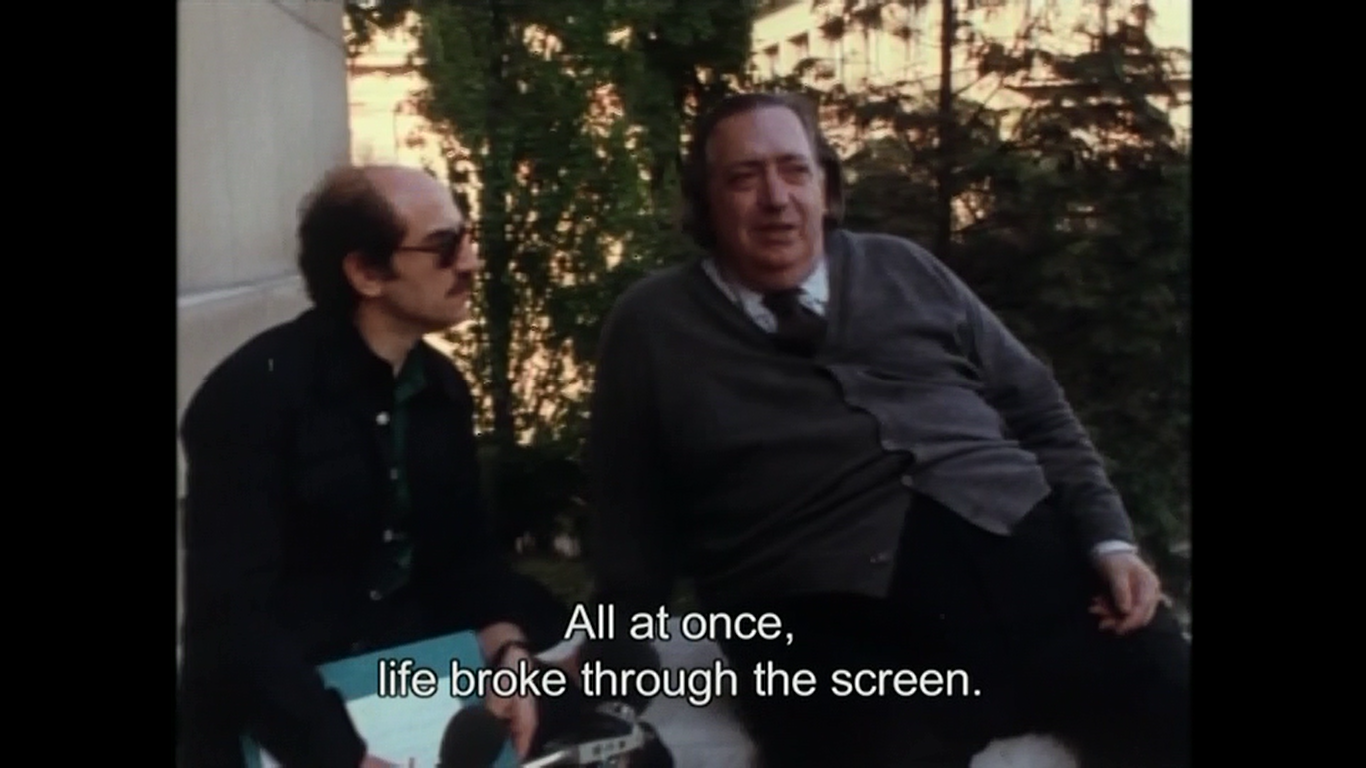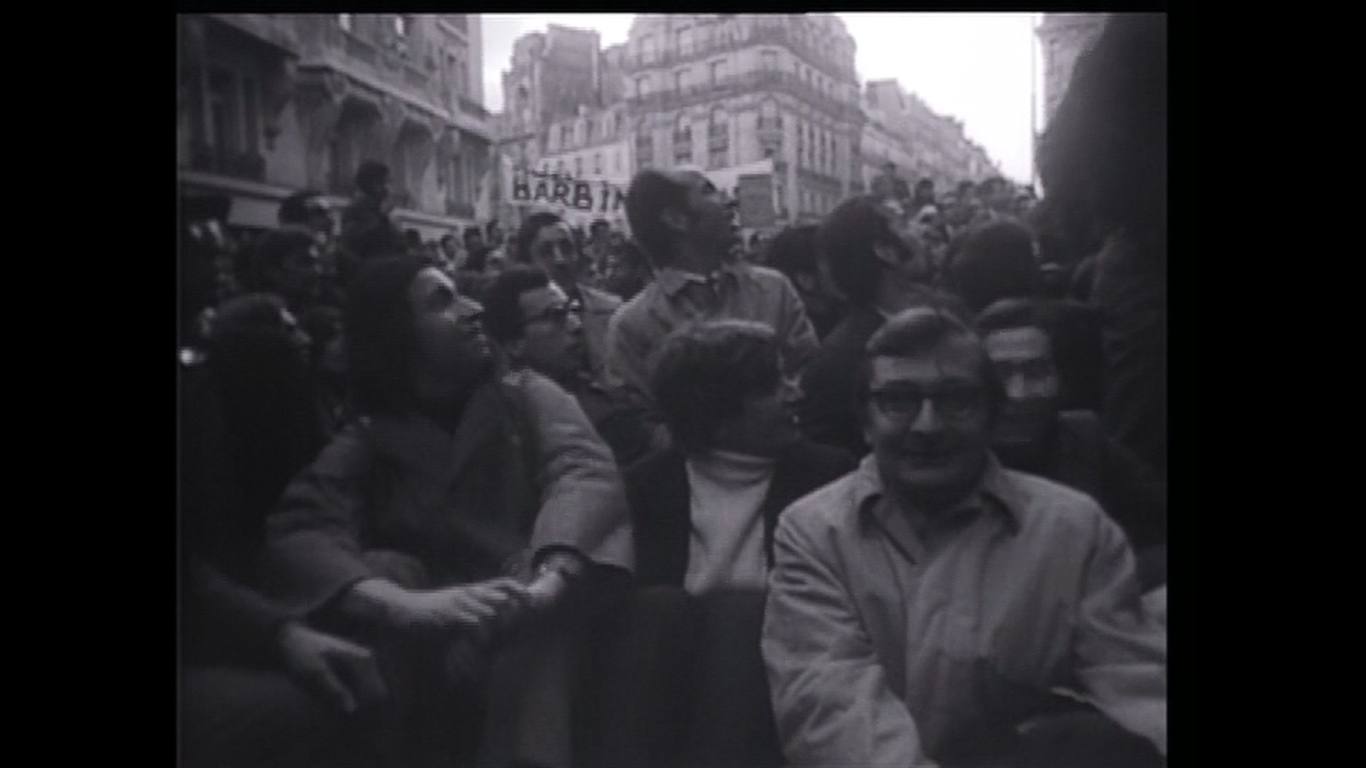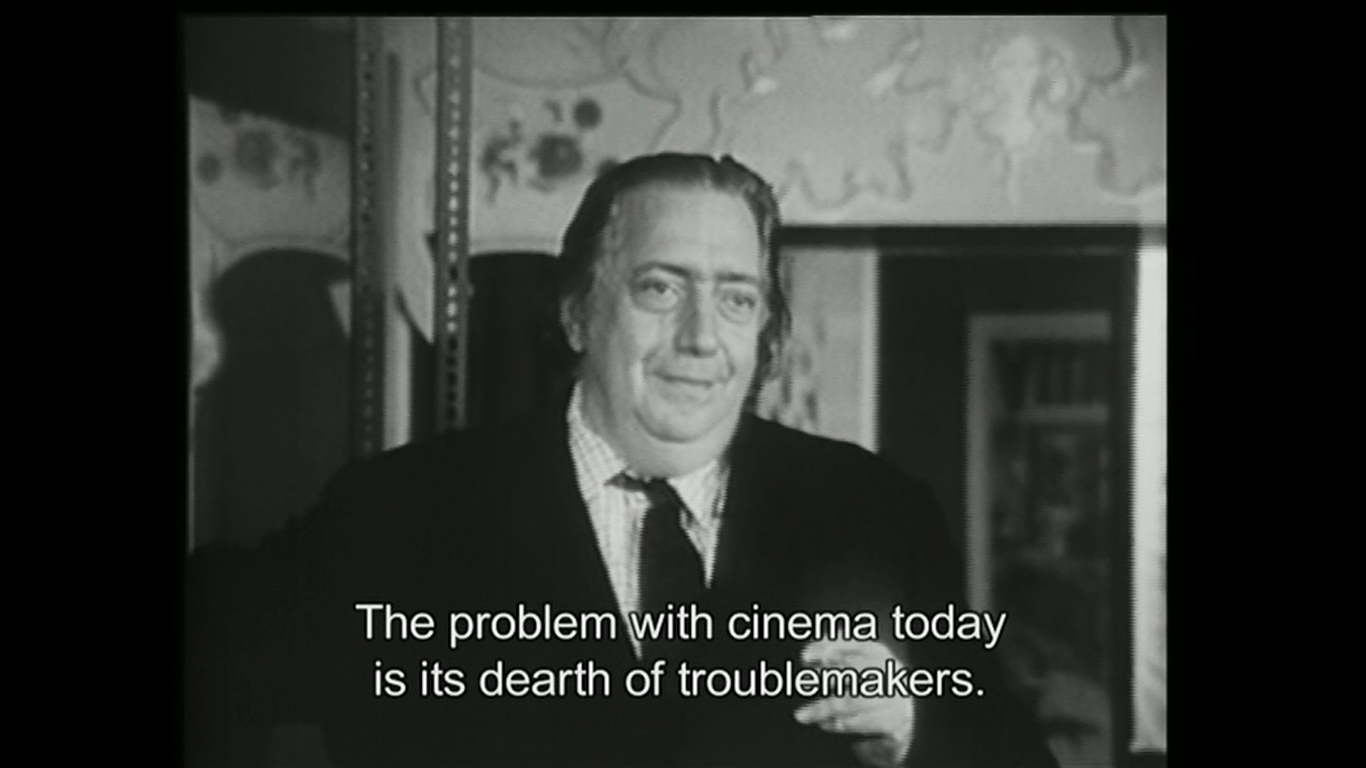With the 50th anniversary of May ’68 – and the famed “events” thereof – approaching, it was a good time to come across the vital documentary Henri Langlois: Phantom of the Cinematheque at my local library. Jacques Richard‘s seven-years-in-the-making account of the father of film preservation only briefly touches on those events, and has its eyes too fixed to the screen to contextualize them rigorously in the larger social upheaval of that year, but it’s scope feels right all the same. Like the museum he created, Langlois’ story is the story of cinema, the battles for its relevance, how it illuminates and how it catches fire.
With copious footage both recent and archival – and help from those Langlois nurtured and celebrated and battled with – Richard fleshes out the mythic. Phantom of the Cinemateque is a love letter from and to cinephiles, with that particular French flair for a grandiosity that can jump from endearing to insufferable in an instant. But if anyone has a claim to the grandiose in film history, it’s Henri Langlois.
 After founding the Cinémathèque Française in 1936 with Georges Franju, Jean Mitry, and a paltry 10 films, it quickly became the social center of every film nut in Paris, the cinephiles awaiting the coining of the term. They were only 4 decades removed from the debut of the Lumière’s L’Arrivée d’un train en gare de La Ciotat; it was the year of Modern Times, appropriately enough. A whole host of famous names appear in Richard’s account, describing this heady milieu – the difficulty in even seeing films, the revelation of silent film, the magic of being in the small crowd not only taking the art seriously but burning like nitrate to see them all, everything, immediately, now. Langlois was their spokesperson, benefactor, funds-raiser and funds-spender, programmer, lecturer, patron saint of an establishment that showed Nosferatu on one floor and Sunrise on the other, with Diary of a Lost Girl screening for a dozen people in the stairwell.
After founding the Cinémathèque Française in 1936 with Georges Franju, Jean Mitry, and a paltry 10 films, it quickly became the social center of every film nut in Paris, the cinephiles awaiting the coining of the term. They were only 4 decades removed from the debut of the Lumière’s L’Arrivée d’un train en gare de La Ciotat; it was the year of Modern Times, appropriately enough. A whole host of famous names appear in Richard’s account, describing this heady milieu – the difficulty in even seeing films, the revelation of silent film, the magic of being in the small crowd not only taking the art seriously but burning like nitrate to see them all, everything, immediately, now. Langlois was their spokesperson, benefactor, funds-raiser and funds-spender, programmer, lecturer, patron saint of an establishment that showed Nosferatu on one floor and Sunrise on the other, with Diary of a Lost Girl screening for a dozen people in the stairwell.
In the war years, the Cinémathèque lived on, in the imagination of Langlois and, when necessary, in secret locations around Vichy France, illicit screenings in apartment flats and empty buildings as necessary. Langlois saved The Blue Angel and The Great Dictator from the Germans, to posterity’s insufficiently grateful benefit. He lost out on others – his regret about passing on a sale of the Theda Bara-starring Salomé is palpable (at the time, he shrugged at the star, the studio, what he presumed to be the useless spectacle), and it’s now lost forever. One of the doc’s many virtues is driving home the random notion of early preservation efforts; the merits of many films were determined by the naked eye, squinting at celluloid, deciding whether or not it deserved to live, or by reputation, usually third, fourth, fifth-hand. The Salomé experience taught Langlois that his own instincts, however enthusiastic, shouldn’t be trusted; masterpiece or forgettable garbage, they all had to be saved. Irrelevant footage might contain vital clues, like a detective investigating our lineage. Pornography, Claude Chabrol points out, can tell us about furniture. A work that seems minor might be the key to everything. It doesn’t matter. They must be preserved, all of them.
 Is it too much to say that the Cinémathèque’s post-war screenings created the New Wave? New Wavers themselves certainly thought so. The doc points out that Langlois’ obsessive programming made authorial stamps across a diffuse body of work so obvious that Truffaut couldn’t help but arrive at the notion of the auteur – Langlois was practicing the theory before the theory could ground his practice. When ’68 did arrive, and the allies of Malraux pushed him out in favor of a more managerial, bourgeois professionalism, it wasn’t received as an inevitable development in a fundamentally conservative state of affairs so much as a statist attack on cinema itself. It was personal and philosophical, an attempt by the forces of order to clamp down on anarchic poeticism by going after its most visible, most ardent proponent. It was a slap in the face, and a warning shot. To the barricades!
Is it too much to say that the Cinémathèque’s post-war screenings created the New Wave? New Wavers themselves certainly thought so. The doc points out that Langlois’ obsessive programming made authorial stamps across a diffuse body of work so obvious that Truffaut couldn’t help but arrive at the notion of the auteur – Langlois was practicing the theory before the theory could ground his practice. When ’68 did arrive, and the allies of Malraux pushed him out in favor of a more managerial, bourgeois professionalism, it wasn’t received as an inevitable development in a fundamentally conservative state of affairs so much as a statist attack on cinema itself. It was personal and philosophical, an attempt by the forces of order to clamp down on anarchic poeticism by going after its most visible, most ardent proponent. It was a slap in the face, and a warning shot. To the barricades!
Imagine being so mad for cinema. But then we are talking about people so possessed by a passion for film preservation and presentation that it eclipsed any reasonable notion of self-preservation, people who had risked lives in fleet dealings with occupying Nazis, handing over relatively minor footage in place of the films the enemy deemed dangerous and demanded be destroyed. Imagine spending every last dime on films you had no way of knowing were any good, except that they were no good lost, and then spending the dime you found to get them shown. (A wonderful story finds Langlois selling his return ticket from New York to buy a rare film, figuring he’ll plead poverty later to the embassy and hopefully they’ll repatriate him.)
 Imagine the ouster of a cinema director, archivist, and programmer leading to buildings seized by the people in protest, imagine the riot police being called, imagine throngs of film-lovers armed with sticks and prepared for physical confrontation in defense of art. Of art!
Imagine the ouster of a cinema director, archivist, and programmer leading to buildings seized by the people in protest, imagine the riot police being called, imagine throngs of film-lovers armed with sticks and prepared for physical confrontation in defense of art. Of art!
Of course, those confrontations outside the Cinémathèque were more complicated, arriving amid the events of 1968 and their precursors, only briefly intersecting with Langlois (and one from which he was largely publicly absent). Director Romain Goupil reflects on the moment when, “probably on orders from Cohn-Bendit,” they took back the building, in the name of Cinema but equally in the name of Fuck The Police:
Godard got clubbed. That was all the proof we needed – we were 15 or 16 – that the state was a terrifying force capable of clubbing the best among us, because they’d made Far From Vietnam and were participants in a whole series of demonstrations. And then, the police lashed out over a sad and dubious matter I didn’t understand one bit. Something about Langlois. Basically, they were right. Simply because the cops were wrong. Systematically wrong about everything, no matter what.
Plus ça change. Still, can we ever love films like this, love the very idea of film like this, its fierce defenders and outlaw voices? Nostalgia’s always old hat, and deadly boring, though the story of Langlois is nothing if not a tribute to its generative possibilities. What’s more, the notion that our best years are behind us is a hallmark of cinephilia in particular – Langlois was already doing it himself decades before his death, looking back to the Russian audiences he argued had been fed so much bad filmic food that their aesthetic taste buds had gone numb by the time Ivan The Terrible arrived … in 1944. (When he was finally given a university class, in Montreal, to teach, it was titled The Future of Cinema. Langlois screened Chaplin.)
So we too look at a CGI landscape cluttered with monster trucks and monsters that turn into trucks and cookie-cutter genre offerings, everything horrifically available, flat. Our misnamed auteurs flee to television, and so we debate the auteurist possibilities of television. Box office receipts reflect social isolation, the screens get smaller and smaller, the social firmament is removed and the entire relation is tenuous. Who will climb barricades for Jessica Jones, fight pitched street battles with the police in defense of Kevin Feige’s obligatory visions and the latest tentpole space opera? What would that even mean? The idealism of cinephilia has been eclipsed by the toxic entitlement and tribal alienations of fandom, internet riots that may as well hinge on dish-soap preferences and whether Netflix belongs at Cannes. Le cinema est mort, vive le cinema.
 It’s silly. Of course, it’s silly. That horrific availability also means wonderfully expanded viewing opportunities, a democratized audience, a democratized universe of voices (or as much aesthetic democracy as capital opts to permit). In one interview, Langlois celebrates the development of newer, cheaper cameras – “we have writers because everyone can write,” he notes cheerfully. It’s not difficult to imagine his possible excitement at the iPhone releases of a Sean Baker or a Soderbergh, the proliferation across platforms, the broadening of our ability to capture, invent, remix, and preserve.
It’s silly. Of course, it’s silly. That horrific availability also means wonderfully expanded viewing opportunities, a democratized audience, a democratized universe of voices (or as much aesthetic democracy as capital opts to permit). In one interview, Langlois celebrates the development of newer, cheaper cameras – “we have writers because everyone can write,” he notes cheerfully. It’s not difficult to imagine his possible excitement at the iPhone releases of a Sean Baker or a Soderbergh, the proliferation across platforms, the broadening of our ability to capture, invent, remix, and preserve.
More than anything, it means trouble, thank god. Troublemaking and troublemakers amid all the stasis. And even in dark moments when nothing new seems possible, some rabble-rouser is lurking, watching, waiting, remembering, and pushing forward. That’s part of cinema’s story, too.

